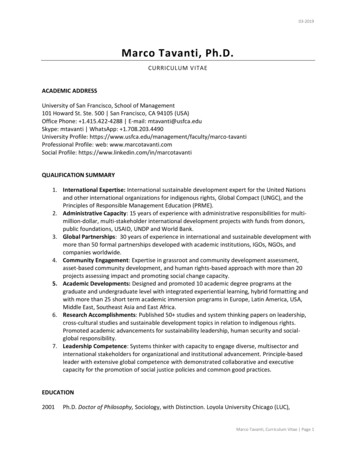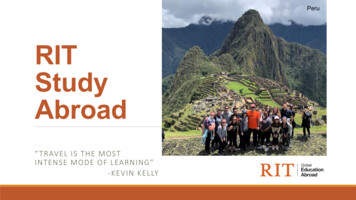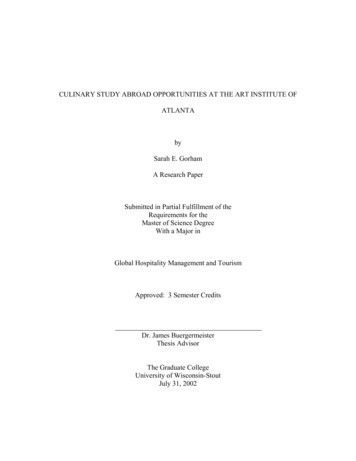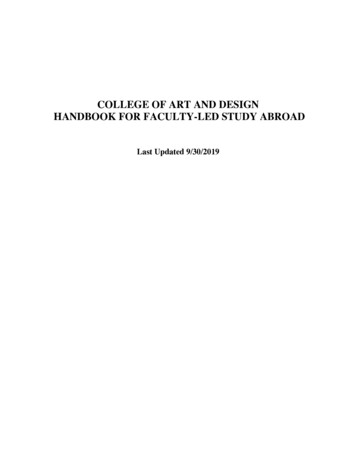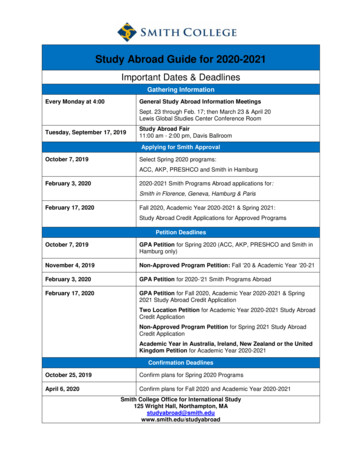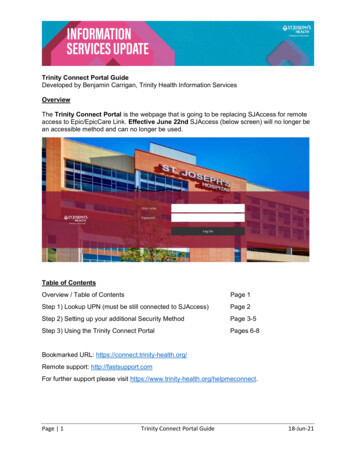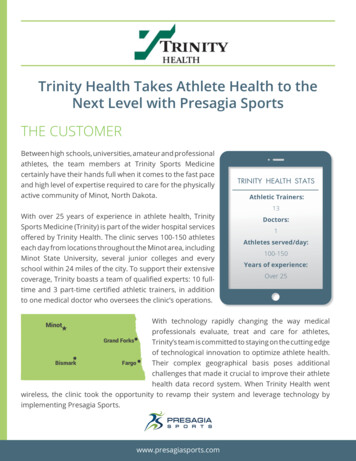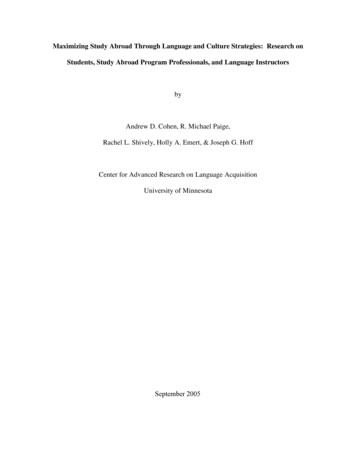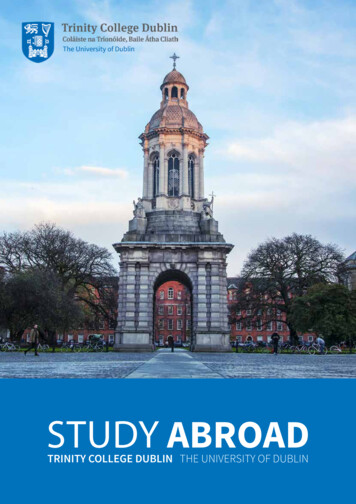
Transcription
STUDY ABROADTRINITY COLLEGE DUBLIN THE UNIVERSITY OF DUBLIN
THINK TRINITYTrinity College Dublin is located in the heart of Dublin, Ireland’s vibrant capital city. Founded in 1592 byQueen Elizabeth I, Trinity has a tradition of scholarship spanning more than four centuries, and is home totalented and inquiring minds, a liberal education, and research conducted at the frontiers of disciplines.Trinity’s historic campus in the middle of Dublin has attracted visitors from all over the world to see ourworld-renowned Long Room Library, our medieval manuscript called the Book of Kells, and our beautifulcampanile and Georgian squares. If you are looking for an engaging, interesting and stimulating experience ata welcoming, fun world-class university, Trinity is for you!Trinity has a long history of welcoming study abroad students from all over the world. Whether you areinterested in coming for a semester or full year, read on to find out more about why you should make Trinityyour home away from home.WhyTrinity?Ireland’stopuniversityCity centrelocationSupportive& funcommunityWorld classeducationEasy to travelin Ireland& EuropeSA supportthroughoutyour timeabroadMix & matchfrom classesacross TCDSafe &fun SAdestinationConnect withTCD globalalumninetwork
DISCOVER DUBLINDiscover how one of the world’s great cities is hometo one of the world’s great universities.Located in the heart of Dublin’s city centre, Trinity’s 47acre campus sits at the very middle of everything the cityhas to offer.Blending a high-energy, multinational professionalculture with traditional Irish warmth and hospitality,Dublin has sprawling parks, historic sites, museums,galleries, cosy cafés and quirky restaurants for thedaytime, with classic pubs, fashion clubs, music gigs andtheatre by night. Dublin is not just a vibrant capital city,is is an international centre of excellence for business,culture and the arts.Trains and buses are just outside Trinity’s front gate,so it is easy to explore the rest of the country, which isworld-famous for its friendly citizens, warm welcomesand rich heritage in music, literature and art. You couldalso hop on a quick bus ride to the airport to take speedyand inexpensive flights all over Western Europe. Trinityprovides the perfect opportunity to discover Dublin andexplore Ireland and Europe; Where will you go from here?Why Dublin? Location: Dublin is Ireland’s transport hub - easy andcheap to travel around Ireland and Western Europe. Social: Museums, galleries, theatre, art, musicfestivals, sport. There are so many ways to get involvedin Dublin’s great social scene.IRELAND Friendly: Dublin is a young, friendly capital city. Language: English-speaking European cityTRINITYCOLLEGEDUBLINEUROPE Safe: One of the safest study abroad destinations inthe world (Top 10 Safest Countries – Global PeaceIndex) Beauty: Explore Dublin’s beautiful mountains to thesouth and bay to the east, take a train or a bus toexplore gorgeous Irish coasts, towns and heritage sitesall over the country. City Life: Voted one of the best student cities in theworld (QS). Tech: Hub of global innovation and technology Culture: UNESCO city of literature Events: Theatre, festivals, music, cultural events,markets and more. Historic: Dublin is more than a thousand years oldand there is ancient and modern history to discover allover the city.
STUDYING AT TRINITYWhen to Study AbroadTrinity College Dublin welcomes study abroad students for a semester or year. Students are welcomed to attend for theAutumn semester only, Spring semester only, or for the full academic year.SemesterAutumn Semester (Michaelmas Term)Spring Semester (Hilary Term)Academic Year (Autumn and Spring Semesters)DatesEnd of August through mid-DecemberMid-January through beginning of MayEnd of August through beginning of MaySemester Start-Up ProgrammeThe Semester Start-Up Programme (SSP) is an optional pre-orientation programme that offers an immersive orientationto Trinity, Dublin and Ireland. It is an optional addition for semester or year study abroad students that includes lectureson Irish History and Culture and excursions. In the Autumn semester it runs for three weeks and is worth 5 ECTS, providingextra credit prior to the start of the term. In the Spring semester it is one week in duration and not credit-bearing. Studentsinterested in the programme can enrol by clicking the SSP box on the study abroad application. More information on theprogramme can be found here: dingireland/semester-start-up.phpWhat Can I Study at Trinity:Study abroad students at Trinity are able to enrol in classes (known as ‘modules’) from across Trinity’s three faculties.Students can apply to up to six schools and departments from the following list:Faculty of Engineering,Mathematics & ScienceBiochemistry and ImmunologyBiologyBotanyEnvironmental SciencesPlant SciencesChemistryComputer Science and StatisticsEngineering: General Engineering, MechanicalEngineering, *Civil Engineering, *ElectronicEngineering, Biomedical EngineeringGeneral logyPhysics: Astrophysics, General Physics,Theoretical PhysicsZoologyFaculty of Health SciencesNursing and Midwifery(Please note that while Trinity welcomes pre-med studyabroad students, study abroad students cannot enrol inmodules in the School of Medicine)Faculty of Arts, Humanities andSocial EnglishEuropean Studies*FilmFrenchGender and Women’s StudiesGermanic StudiesHispanic Studies*HistoryHistory of Art and ArchitectureIrish and Celtic LanguagesItalian*LawLinguistic, Speech and Communications ScienceMusicNear and Middle Eastern Studies*Philosophy*Political Science*PsychologyReligions, Theology and EcumenicsRussian and Slavonic StudiesSocial Work and Social PolicySociology*Schools and Departments noted with an asterisk (*) are particularly in demand, so early applications are recommended.
STUDYING AT TRINITYSelecting Areas of Study and ModulesInformation on what modules are available can be foundin the Module Directory, located at this link under the‘Module Directory’ drop-down: module-enrolment.php. Students should peruse the Module Directory priorto starting their application so they have an idea ofwhat modules are available in each of the Schools andDepartments and can specify if any modules are crucialto their study abroad at Trinity, pending availability andoffering. Note that students with interdisciplinary areas ofstudy will likely need to combine modules from differentSchools and Departments.Academic SupportTrinity provides its study abroad students with anorientation programme which helps to prepare studentsfor their time abroad. Trinity also offers a number ofacademic supports across the College to assist students:Office of Student Learning and Development (advising,workshops, programmes), English for Academic Purposes(EAP) (workshops, programmes), and a Personal Tutor,who provides academic advice and assists with anyacademic difficulties.CreditStudents take 30 ECTS per semester at Trinity. ECTS(European Credit Transfer and Accumulation System) isa credit weighting, so the number of modules (classes) astudent takes at Trinity varies on the credit values for eachof their modules, which usually have a 5, 10 or 15 ECTSvalue. Students must take a minimum of 20 ECTS in asemester and 45 ECTS for the academic year. Make sure tocheck in with your home university or programme providerfor credit load requirements.MarkingThe following marking scheme applies in Trinity CollegeDublin. Please note that marks can vary among Facultiesat Trinity, and it is important to recognise that thegrades may be very different from those at your homeinstitution. While First Class Honours may be common inyour home university, please note that marks over 70 arevery rare at Trinity. Make sure to discuss credit transferand grade conversion with your home institution prior tostudying abroad.Degree ClassificationFirst Class HonoursSecond Class HonoursFirst DivisionSecond Class HonoursSecond DivisionThird Class HonoursFailGradeIII.1Percentage ow 29%
APPLYING TO STUDY ABROADAT TRINITYEligibility RequirementsStudents must be currently registered at a universityin good standing. A minimum cumulative Grade PointAverage (or equivalent) of 3.3 is required. If English is notyour first language, you will also need to submit proofof English language proficiency. Details and minimumrequired scores can be found /undergraduate/index.php.How to ApplyApply to Trinity by clicking the relevant semester at thislink: hange/index.php. Make sure to complete the onlineform and provide an official transcript and signed letterof recommendation. The Application Instruction Guidecan also be located at the same link. When you apply,make sure to specify all of the Schools and Departmentsyou plan to take modules in. Your application will beevaluated for admission to each area of study specified onyour application. See Studying at Trinity pages for lists ofSchools Departments available and the Module Directorylink which includes the most up to date information aboutcurrent Trinity modules open to study abroad students.Tuition FeesFees for Study Abroad students can be found on theAcademic Registry website. Study Abroad students canfind fees listed on the Undergraduate Non-EU Student FeesPDF under the Visiting/Erasmus (Undergraduate) nts.Please note that total cost of attendance will vary based onyour home university policies, programme and/or provider.Other FeesAccommodation is charged separately from tuition, andcosts approximately 1,000 per month for modern studentresidences located in the heart of Dublin city centre. SeeLife at Trinity section for more information. Visas arealso a separate cost, and all students must register withimmigration after arrival, which costs 300.ScholarshipsTrinity College Dublin offers the following scholarships tostudy abroad students from non-EU ips Trinity College Dublin STEM Study Abroad Scholarship( 2,000) Global Study Abroad Excellence Scholarship ( 2,000) Trinity College Dublin Generation Study Abroad TravelGrant ( 2,000) Go Overseas Scholarship (full tuition scholarship)Programme ProvidersIf you are studying abroad through a provider, pleaseconsult them directly for application deadlines andinstructions, programme information and costs.Providers include: Academic Programs International:www.apistudyabroad.com Arcadia University, The College of Global Studies:www.arcadia.edu Foundation for International Education:www.fie.org.uk IES Abroad:www.iesabroad.org Institute for Study Abroad, Butler University:www.ifsa-butler.org International Studies Abroad:www.studiesabroad.comApplication DeadlinesAutumn Semester (Michaelmas Term)Spring Semester (Hilary Term) Studyand Full Year StudyApplications Open 1 November1 AugustApplications Close 15 April15 OctoberPlease note that early application is recommended as demand for places is high and applications are evaluated on arolling basis. Students should also reach out to their home university by their deadlines for the requisite approvals andpaperwork.
LIFE AT TRINITYAt Trinity, education is not confined to the classroom. Trinity is known for its vibrant student life oncampus, and our location in the heart of Dublin city makes it easy to get involved in city life as well.A warm Trinity welcome awaits all our students – with over 200 clubs, societies and sports groups there arecountless ways to get involved in life at Trinity and meet your fellow students.Student SocietiesAt Trinity, Clubs and Societies are the best way to meetstudents with similar interests and get involved in studentlife. Trinity’s extracurricular life features over 200 societies,sports clubs and publications, including ‘The Phil’ and ‘theHist’ – the oldest debating societies in the world who bringin heads of state, celebrities and artists for fascinatingdiscussions! The International Student Society is alsoanother popular choice for study abroad students as theylead weekend trips all over Ireland – a great way to see thecountry inexpensively and make friends! For a full list see:www.trinitysocieties.ie.SportsOn-campus sports facilities include a state-of-the-artSports Centre, fitness classes, a fitness theatre, a 25mswimming pool, a climbing wall, cycling studios, multipleplaying pitches, boat house, and more. Every studentreceives automatic access to our Sports Centre. SportsClubs are also a popular option for staying active, andserves as a great way to continue involvement in sportwhile abroad. ere are always events on at Trinity – from researchsymposia to conferences, movie nights in the GlobalRoom to social events across campus like the Trinity Balland more, there’s always something to do and a way toget involved. www.tcd.ie/news events/events.Trinity Global RoomThe Trinity Global Room is a unique social and event spacefor international students at Trinity. The Global Room,acting as a platform to celebrate cultural diversity withinTrinity, is a space where students and staff can relax,converse and learn about different customs. It offers over300 international television channels, access to advicefrom peers about navigating Dublin and Trinity, and a fullcalendar of internationally themed events. -room.Accommodation in Dublin City CentreTrinity is pleased to offer modern city centreaccommodation to its study abroad students at theBinary Hub. The Binary Hub is a modern, purpose-builtstudent accommodation city in the heart of the Liberties,a short walk from Trinity. The newly-built complex hasmany student events throughout the year and includes:an on-site Trinity Junior Dean, a friendly team on-site24/7, on-site maintenance, regular programme of socialevents, modern gym (open 6am – midnight), 100MBBroadband & WiFi, common room and study room,laundry room, bike storage, and even a resident pet! Allstudents receive private bedrooms and bathrooms insuites shared among 4-6 students, with shared kitchenand living areas. More information can be found gTrinity prides itself on giving back to Dublin city and hasnumerous volunteering opportunities for students to getinvolved in. Comprised of ten different campus groups,Trinity Volunteering is an umbrella student initiative thatrun volunteering events on campus and in Dublin city.Volunteering is an excellent way to get involved in localcommunities, make connections and give back. forum.php.Working in IrelandNon-EU study abroad students who are studying atTrinity for a full academic year are eligible to work up to amaximum of 20 hours per week during term and up to 40hours per week during University holidays. Single semesterstudy abroad students are not permitted to work in Ireland.
SUPPORT AT TRINITYStudy Abroad TeamPersonal TutorS2S MentorStudents’ UnionThe Study Abroad Team is your primary point of contactthroughout your study abroad experience. We adviseon queries, provide pre-arrival information and detailedorientation information, organise events on campusfor study abroad students, and are a source of supportand advice throughout your study abroad experienceand beyond.Every Trinity student is assigned a Student-to-Student(S2S) mentor who keeps in regular contact throughoutthe semester. As fellow students, they can give adviceon relevant modules to take, how to make the most outof your time in college, and listen to any concerns youmay have. They will give you your campus tour duringOrientation, and will be in touch throughout your time oncampus. You can reach out to them with any questionsyou may have about your academic or social life at Trinity.www.tcd.ie/Student Counselling/student2student.Global Room and Global Room AmbassadorsThe Global Room’s staff and its Student Ambassadorsare always on-hand to answer many practical day-today questions about being an international studentat Trinity. From its popular events like AmericanThanksgiving, Chinese New Year, and Puppy Day duringexam times, to its New2Dublin group, its screens withover 300 international TV channels, and the Meet andGreet programme for arriving students, the GlobalRoom is a great home away from home for internationalstudents at Trinity. -room.Global OfficersMany departments in Trinity College have a Global Officer– a staff member located in Schools, dedicated to advisinginternational students and working on internationalactivity within their school. Global Officers assist withmodule selection, organise social events and act as pointsof contact for all international students. www.tcd.ie/globalrelations/about.Academic RegistryThe Academic Registry is the main student support hubin Trinity and provides services encompassing documentcertification and student letters, admissions, studentfinance advice, registration, transcripts, examinations, andgraduation services. They have a service desk in the WattsBuilding open from 9.00am to 5.30pm on weekdays anduntil 5pm on Friday. You can contact them by phone at 353 (0)1 896 4500 or by email at academic.registry@tcd.ie.Trinity provides all undergraduate students with a PersonalTutor - a blend of mentor and advisor who providesconfidential personal and academic advice and supportthroughout a student’s time in the University. StudyAbroad students are welcome to reach out to the Tutor’soffice, and should contact them to raise any academicdifficulties or concerns. www.tcd.ie/SeniorTutor.Every registered student at Trinity College is automaticallya member of the Students’ Union (SU). The Students’Union is a representative body with five full-time studentsabbatical officers and a number of part-time officers, wholook after the educational and welfare needs of Trinity’sstudent population, as well as organising entertainmentand events. www.tcdsu.org.Student Counselling ServicesThe Student Counselling Service is a confidential,professional service available free of charge to everyTrinity student. It offers help in coping with any personalor emotional problems and offers learning supportand development aids. Appointments should be madedirectly with the Counselling Service. The CounsellingServices runs a course ‘Feeling @ Home in TCD’ which isaimed particularly at international students. www.tcd.ie/student counselling.Disability ServiceThe Disability Service is the support service for studentswith any disability or special learning needs. Studentsrequiring support from Trinity due to the impact of theirdisability or specific learning difficulty are advised tocontact the Service as early as possible to explore whatsupports can be provided. To find out more, contact theDisability Office here: www.tcd.ie/disability.Please Note: Policies vary country to country, so Disabilityworks with students to provide the best supports possiblewithin our system.College Health ServiceAll full-time registered students are eligible to use theCollege Health Service throughout the year. The serviceoffers on-campus primary health and psychiatric care.Students can also avail of out of hours services andspecialised clinics in physiotherapy, sexual health care,eating disorders, minor surgery, vaccinations and bloodtests. www.tcd.ie/CollegeHealth.For Academic Supports, see Studying at Trinity.
STUDENT VOICESDon’t take our word for it, hear what our students have to say!‘‘One of the major benefitsof living in a city like Dublin is theabundance of cultural activities andevents. Particularly, there is a plethoraof diverse and fascinating museums.”– Jessica Murphy,Brown University‘‘Trinity College is known for itsliterary history, with accomplishedwriters Anne Enright, Samuel Beckett,Bram Stoker, Jonathan Swift, andOscar Wilde counted among theuniversity’s alumni. With Dublinnamed a UNESCO City of Literature,visiting & international studentswould be remiss to miss out on someof the amazing independent writingand arts happening in the city duringyour time here. I love heading out tothe events recommended to me byLitSoc & my English professors.”– Clodagh Schofield,University of Sydney‘‘Everyone should study abroadfor a full year if given the opportunity.If you study abroad for a semester,you’ll just be getting comfortable andfamiliar when it’s time to pack up andleave.”– Miles Morgan,University of Chicago‘‘If one thing has struck meabout Trinity College Dublin, it is howincredibly different the university isfrom what I imagined it would be.I got some things right: sweepinglawns, beautiful buildings andincredibly interesting professors.However, I definitely did notanticipate this school’s incredibleknack for engaging students, formaking them feel welcome and athome in a prestigious place that haswelcomed so many great minds andcould have easily become standoffishand exclusive.”– Sydne Tursky,University of Arkansas‘‘One of the factors that mustcontribute to the great thinkersand writers that this university hasproduced, is the vast amount ofindependent learning that one hasto do. This emphasis on self-teachingand independent research permeatesevery area of academic life.”– Anna McAlpine,University of St. Andrews‘‘Even though I’m only here forthe one term, all of the societies stillwanted me to join them and takepart in their activities. I didn’t knowbefore getting here if it would be easyor difficult to get involved since I amonly here for such a short time, but sofar it’s been really easy to feel like amember of the student body.”– Madison Tucky,University of Southern CaliforniaTo read more from students who have studied abroad at Trinity, peruse Trinity’s Study Abroad blog road.
SPECIAL PROGRAMMESIn addition to semester or year study abroad at Trinity, we offer the following special programmes.Irish School of Ecumenics SemesterAbroad Programme: Conflict, Religion andPeace-building in International AffairsThis programme is open to students studyingabroad at Trinity for a single semester. Itprovides challenging opportunities to attain acritical understanding of the perennially relevantfields of religion, conflict and peacebuilding.It is distinguished by ISE’s dynamic multidisciplinary approaches to teaching andresearch. Students develop critical insights intothe dynamics of faith and culture in the faceof shifting ‘modernities.’ The contested causesand consequences of violence are analysed,together with religion’s role in maintainingsectarian violence and / or promoting mutualunderstanding in local and global spheres.Students have the opportunity to takecultural field trips to Northern Ireland, theInternational Criminal Court in The Hague,or the UN in Geneva. Participants who comefrom every continent find innovative prospectsfor relating theory and practice and engagingcontemporary issues and case studies. Modulesavailable include: Religion, Conflict and Peacein International Relations (10 ECTS), EngagingReligious Fundamentalism (10 ECTS), Gender,War and Peace (10 ECTS), and World Christianityand Interreligious Dialogue (10 ECTS). Pleasefind out more at: www.tcd.ie/ise.January Term ProgrammeTrinity’s Department of English offers a studyabroad programme called Modern Irish Writingfor international undergraduate students duringthe month of January. The programme introducesstudents to the best of Irish literary tradition andculture from 1900 to the present day. (Please note,this programme cannot be completed in additionto a Spring term abroad at Trinity because ofoverlap in dates). For more information see: www.tcd.ie/English/ international/january-term/.CASA-Trinity Study Abroad ProgrammesTrinity offers special programmes for studentsfrom Consortium for Advanced Studies Abroad(CASA) member universities. The CASA-TrinitySemester Programme provides students with theopportunity to enrol in modules across Trinityas any other semester or year study abroadstudent would, with added access to the CASAevents, excursions, research opportunities, anacademically rigorous orientation week andthe CASA-Trinity Programme Director, whoprovides individual academic advising, runsthe events and excursions, and provides healthand safety support. CASA-Trinity also offers anine week Summer Programme that combinesa Contemporary Global Politics course taughtby Trinity College Dublin faculty and a six weekunpaid internship in a variety of disciplines, whichoffers students an extraordinary opportunity tostudy and work in Dublin for a summer. Moreinformation on the programmes and Consortiumhere: www.casa.education.
NOTABLE ALUMNISince 1592, Trinity has educated a community of alumni that have shaped our world. Did you know thatTrinity has over 115,000 alumni in over 150 countries worldwide? All study abroad students are eligible tojoin Trinity’s global network of Alumni.Samuel BeckettNobel Prize for Literature, 1969Oscar WildePlaywrightJonathan SwiftSatirist and PoetMary McAleeseFormer President of IrelandProfessors Luke O’Neilland Jonathan Coleman2014 World’s Most Influential ScientificMindsBram StokerNovelistMary RobinsonFormer President of Ireland &UN High Commissioner for HumanRightsGeorge BerkeleyPhilosopherEavan BolandIrish PoetErnest WaltonNobel Prize for Physics, 1951Edmund BurkePhilosopher and Political TheoristD.B. Weiss and David BenioffEmmy award-winning writers ofHBO’s ‘Game of Throneswww.tcd.ie/alumni
Get in TouchFor more information on studying at Trinity, visit ourwebsite at: www.tcd.ie/studyFor first-hand accounts of student experiences, visit ourstudent blog at: https://tcdglobal.wordpress.com/For more information about the opportunitiesavailable for visiting students or if you have questionsabout making Trinity work for your academicprogramme, please email: study.abroad@tcd.ieGlobal Relations OfficeTrinity College Dublin,Global Relations Office,East Theatre, College Green,Dublin 2,IrelandPhone: 353 1 896 4507www.tcd.ie/globalrelationsConnect with the International Partnerships and StudyAbroad team: www.tcd.ie/globalrelations/aboutJoin the Trinity Community/tcdglobalrelations@tcdglobaltcdglobalThe Board of Trinity is not bound by errors or omissions from this publicationGR-BRH-SA-02-19tcdglobal.wordpress.com
evaluated for admission to each area of study specified on your application. See Studying at Trinity pages for lists of Schools Departments available and the Module Directory link which includes the most up to date information about current Trinity modules open to study abroad students. Tuition Fees Fees for Study Abroad students can be found .
